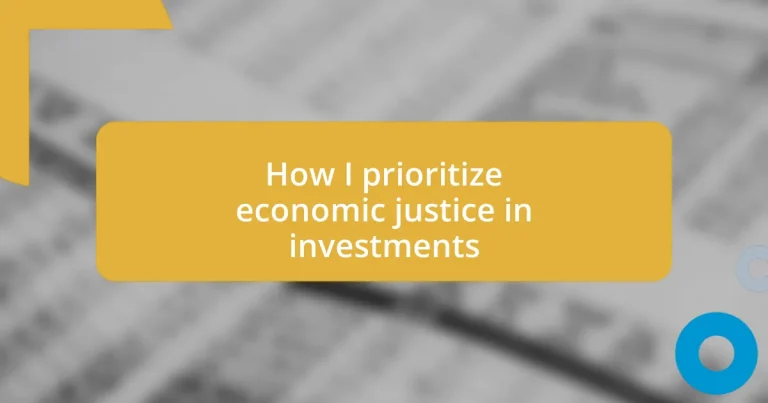Key takeaways:
- Economic justice involves recognizing systemic barriers and prioritizing investments that support marginalized communities and equitable growth.
- Identifying ethical investment opportunities requires thorough research, evaluating sustainability practices, community involvement, and diversity within organizations.
- Measuring long-term financial performance should encompass social impact, considering broader benefits beyond immediate returns.
- Advocating for transparency in investment practices builds trust and accountability, empowering investors to make informed decisions aligned with their values.
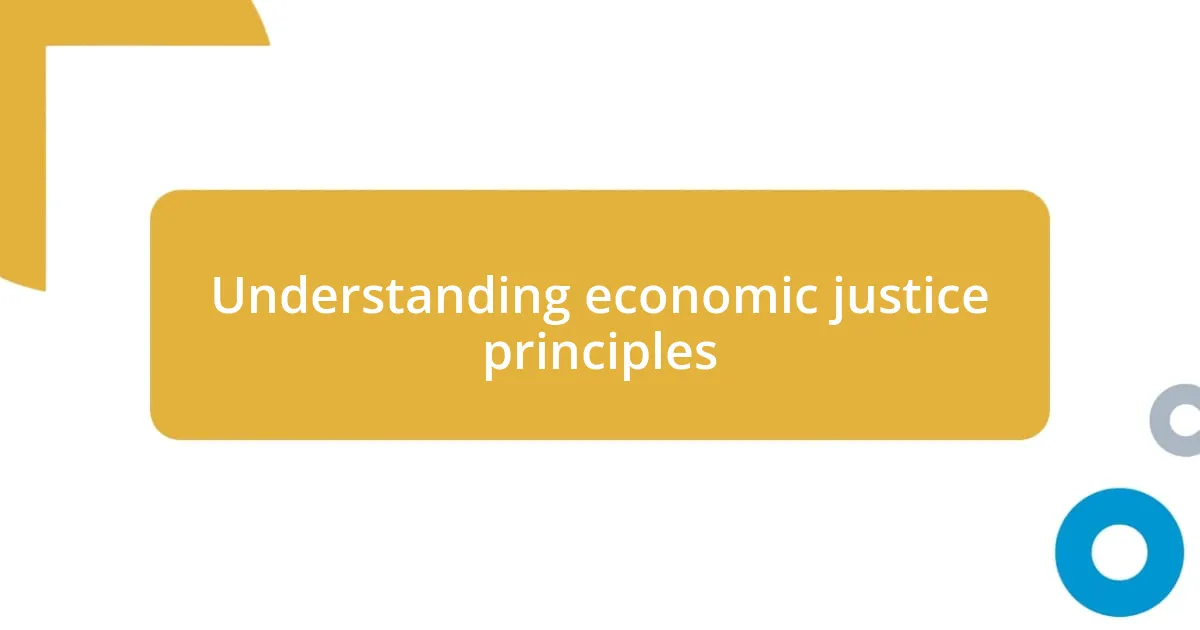
Understanding economic justice principles
Economic justice isn’t just a theoretical concept; it resonates deeply with real-life experiences and struggles. I often think about my own community members who have faced systemic barriers, from inadequate access to affordable housing to quality education. What does it mean to seek equity when so many are starting from such different places?
There’s an underlying principle that economic justice advocates for fairness across socio-economic divides. For instance, when I reflect on my family’s financial history, I see how wealth accumulation has been influenced by opportunities that were simply not available to others. Realizing this has shaped my investment priorities to focus on initiatives that support marginalized groups, like community-owned businesses and cooperative models.
It’s also crucial to consider the ethical implications of our investment choices. When I hear about companies prioritizing profits over people, it stirs something in me. I wonder, how can we challenge this mindset? By integrating principles of economic justice into our investment strategies, we can redefine success—not just in terms of financial returns, but in fostering inclusive growth and empowering those who have been traditionally excluded from economic opportunities.
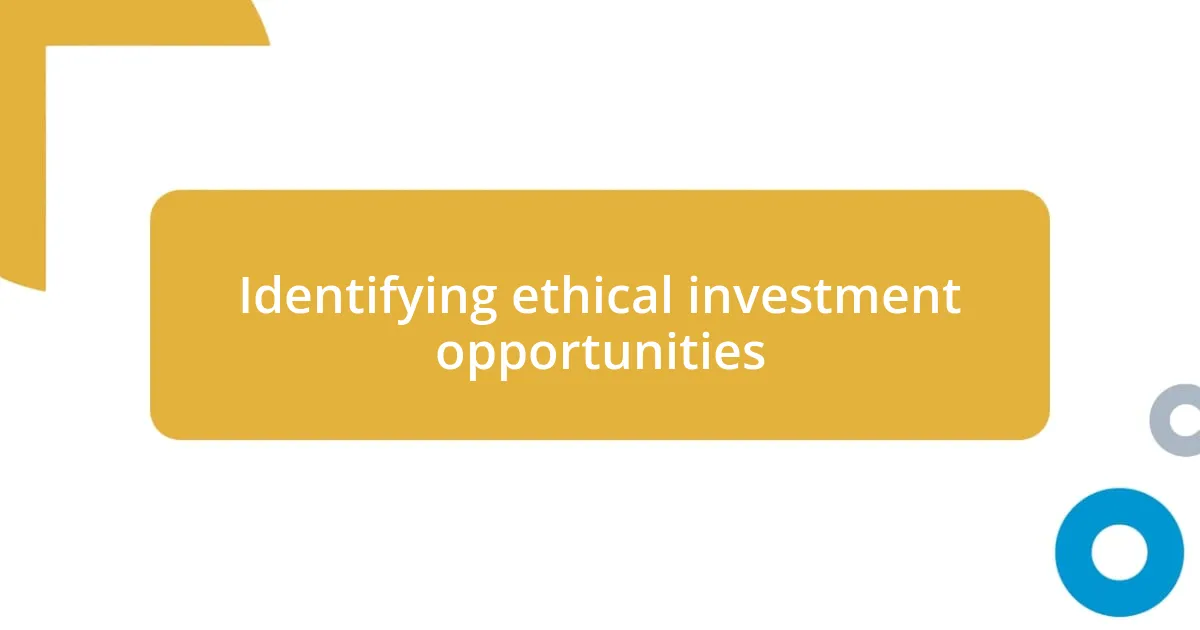
Identifying ethical investment opportunities
Identifying ethical investment opportunities requires a keen eye and a commitment to aligning financial goals with social values. I remember the excitement I felt when I discovered a local start-up that was not only innovative but also dedicated to sustainability and community development. It wasn’t just about the potential returns; it was about supporting a vision that resonated with my values. This experience reaffirmed my belief in seeking out investments that prioritize social impact.
Here are some steps I take in identifying ethical investment opportunities:
- Research Companies’ Practices: I dive deep into their business model, leadership diversity, and community engagement.
- Evaluate Environmental Impact: I look for companies that prioritize sustainability and use eco-friendly practices.
- Seek Certifications: I prioritize businesses with Fair Trade or B Corporation certifications, which indicate a commitment to ethical standards.
- Assess Community Involvement: I consider how companies support the local community, from job creation to participation in local initiatives.
- Monitor Social Justice Initiatives: I pay attention to companies that actively support diversity and inclusion within their workforce and supply chain.
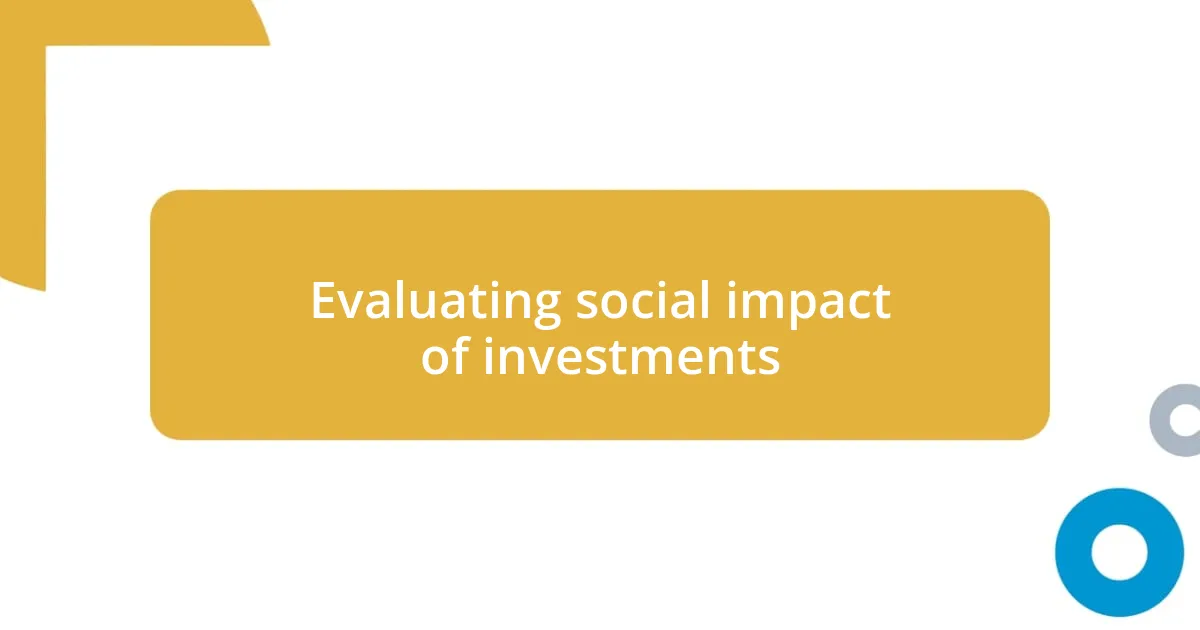
Evaluating social impact of investments
Understanding how to evaluate the social impact of investments is essential for anyone wishing to prioritize economic justice. When I determine the effectiveness of an investment, I often ask myself questions about how it benefits the community. For instance, I once invested in a small cooperative that provided job training for marginalized youth. It was heartening to see not just economic returns, but also the lives being transformed through skill-building and empowerment.
Sometimes, the social impact isn’t immediately measurable, which makes evaluation challenging. This reminds me of when I engaged with a community-supported agriculture (CSA) initiative. The financial returns were modest, but the real value lay in fostering local food security and supporting small farmers. I learned that these nuanced impacts should be factored into assessing overall success and sustainability.
To make comparisons clearer when evaluating social impact, I find it helpful to create a structured approach. Here’s a simple look at different aspects of social impact:
| Criteria | Example Investment |
|---|---|
| Job Creation | Community cooperative providing training to local youth |
| Environmental Sustainability | Local CSA promoting organic farming |
| Community Engagement | Social enterprise addressing food deserts |
This perspective allows me to maintain a focus on broader societal benefits while pursuing profitable ventures, reinforcing my belief that finance can be a powerful tool for positive change.
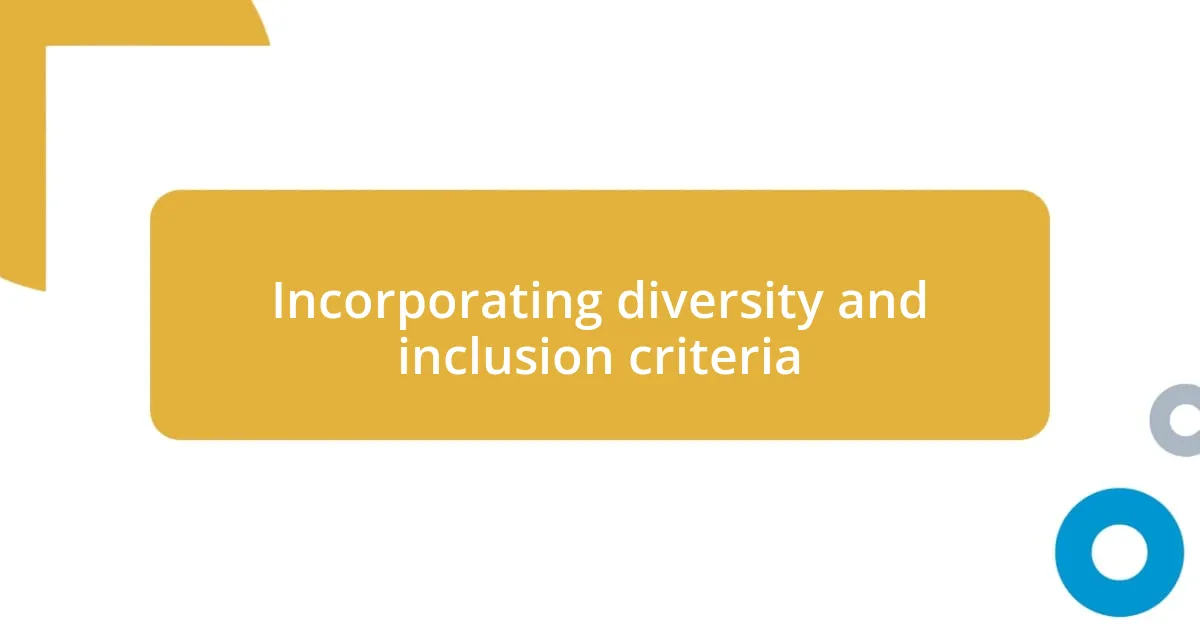
Incorporating diversity and inclusion criteria
Incorporating diversity and inclusion criteria into my investment strategy has become a cornerstone of how I evaluate opportunities. I remember attending a pitch session where a diverse team presented their tech startup. Their unique perspectives not only sparked innovative ideas, but they also challenged the conventional norm in a refreshing way. It made me reflect: how often do we miss out on groundbreaking ideas by overlooking diverse voices? That moment solidified my belief that investments should actively promote inclusivity, both socially and financially.
When assessing potential investments, I focus on the diversity of leadership and their commitment to inclusion at every organizational level. It’s crucial to look beyond just numbers; I ask questions about how these companies foster an inclusive culture. For example, I once connected with a fund manager who prioritized investments in women-led businesses. The impact of that focus wasn’t just on profits but also on empowering women entrepreneurs and contributing to tangible societal change. I felt a sense of pride knowing my investment was part of this empowering journey.
Ultimately, I believe that evaluating diversity isn’t just about meeting quotas; it’s about creating a richer tapestry of ideas and opportunities. By selecting companies that prioritize inclusion, I’m not merely investing in profits, but in social equity and the potential for transformative change. Each investment I make is a step towards a more equitable economic landscape, and that keeps me motivated and hopeful for the future.
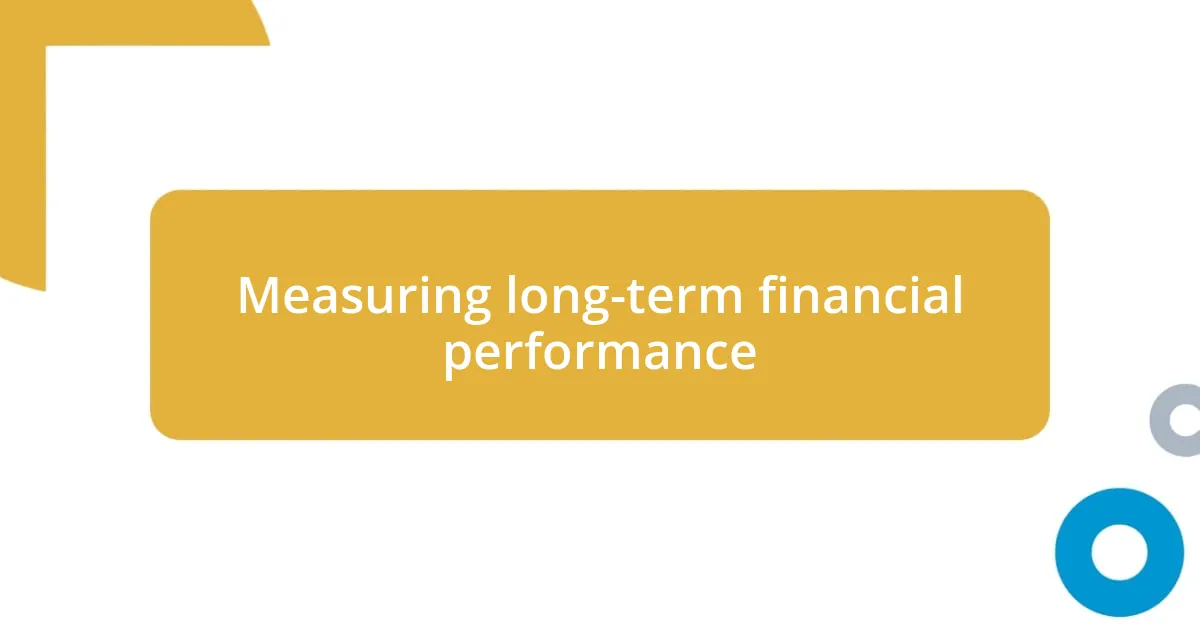
Measuring long-term financial performance
When I think about measuring long-term financial performance, I often reflect on the importance of looking beyond mere numbers. One of my investments was in a community-focused initiative aimed at renewable energy solutions. Initially, the financial returns were modest, but over time, I noticed the ripple effects—job creation, local economic growth, and reduced carbon emissions. It made me realize that true performance includes the broader impact an investment can have on society.
I also find it valuable to track performance over extended timelines. In one case, I invested in a startup that enhanced digital access for underserved populations. At first, the metrics seemed underwhelming, but as community engagement grew, their user base skyrocketed. It taught me that patience is essential; sometimes, the best investments need time to flourish. Have you ever made an investment where you initially doubted the returns but later saw the bigger picture?
In my experience, I like to measure performance through a diversity of indicators. For example, I recently evaluated a social enterprise that prioritizes supporting local artisans. Not only did their sales increase, but they also fostered a sense of community pride and cultural preservation. This dual measuring—financial and social—allows me to appreciate the complexities involved. Every return tells a story, and those stories add depth to my investment philosophy, reminding me that financial success and community welfare often go hand in hand.
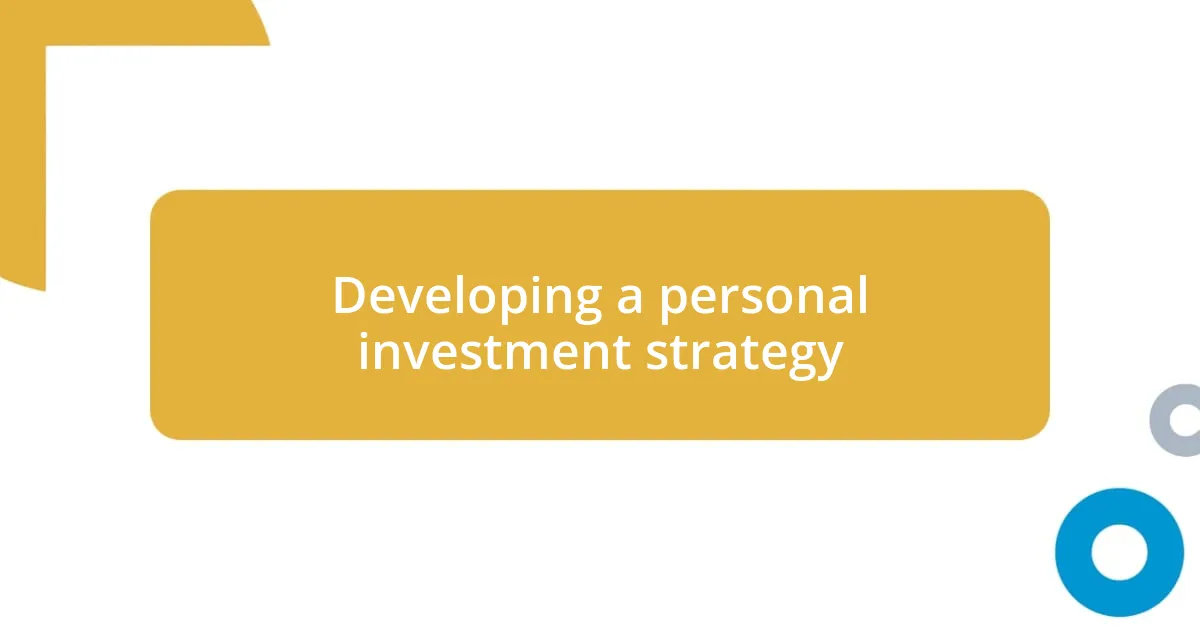
Developing a personal investment strategy
When developing my personal investment strategy, I make a concerted effort to align my financial goals with my values. For instance, I once found myself at a crossroad when considering a traditional energy company versus a solar startup. While the former promised quick returns, I felt a stronger connection to the latter’s mission of sustainability and its potential to uplift communities. This experience taught me that investing isn’t just about the bottom line; it’s about fostering a future I want to see. Have you ever faced a similar dilemma where values clashed with potential profits?
Another crucial aspect of my strategy is setting clear priorities that reflect what economic justice means to me. I remember diving into research for my portfolio and specifically sought out businesses that actively promote fair wages and ethical working conditions. One notable investment was a cooperative that enables local farmers to sell their produce collectively. Watching the community thrive while earning a fair income filled me with a sense of fulfillment. It made me wonder: how can we as investors choose options that empower rather than exploit?
I’ve also learned that flexibility is key in this journey. A few years back, I invested in a tech firm focused on workforce development, only to discover they were pivoting their model to prioritize upskilling marginalized groups. Initially, I hesitated, but I soon embraced their vision, leading to a richer understanding of impact investing. This taught me that staying open to new ideas and adapting my strategy can lead to unexpected rewards that not only benefit my portfolio but also align with my commitment to economic justice. How willing are you to adjust your perspective when new opportunities arise?
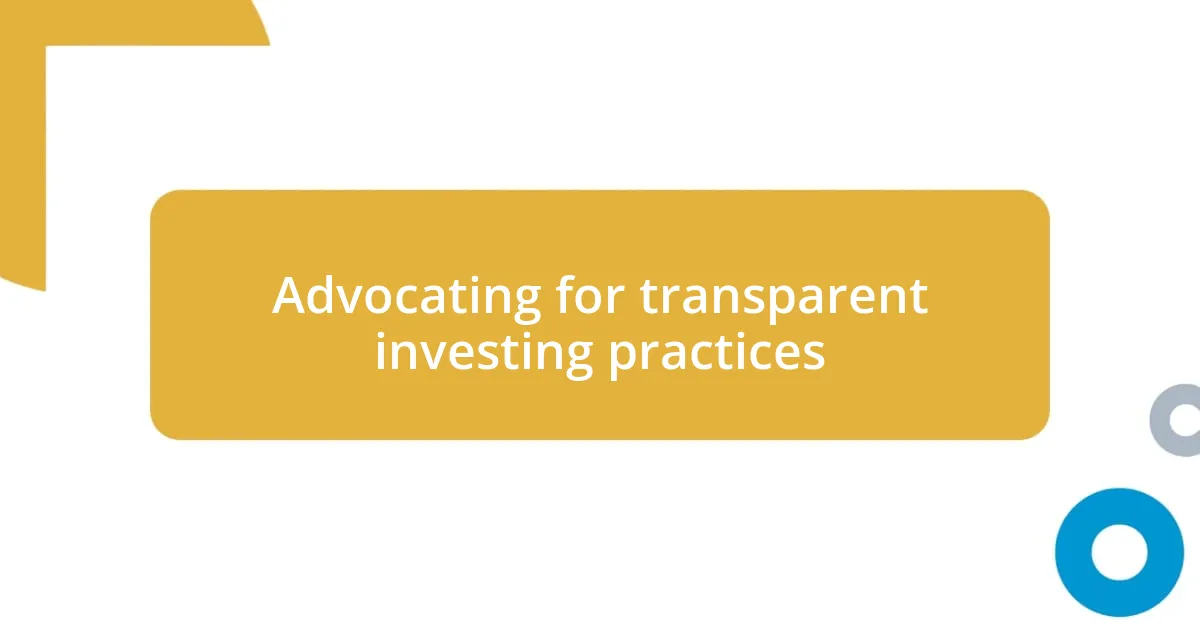
Advocating for transparent investing practices
Advocating for transparent investing practices is something I’m deeply passionate about. Transparency builds trust, and I vividly recall a meeting with a fund manager who openly shared their investment selection criteria and the potential risks involved. It was refreshing to see someone prioritize honesty over hype. This experience cemented my belief that investors have a right to clear insight into where their money goes. Have you ever met someone in finance who really opened the door to transparency for you?
In another instance, I dedicated time to research a nonprofit that focuses on financial literacy for underrepresented communities. Their detailed reporting on how funds were allocated and the measurable outcomes of their programs stood out to me. It reinforced my commitment to investing in organizations that prioritize openness, as it empowers investors and reinforces accountability. How often do we stop to consider the stories behind the statistics?
Moreover, I make it a point to ask tough questions during investment reviews. Once, during a quarterly meeting with a socially responsible fund, I probed about their environmental impact assessments. The candid discussion surrounding their approach illuminated the complexities in the industry, showing me that true transparency brings the nuances to light. Engaging in these conversations not only enriches my understanding but also champions a culture that values accountability—something I believe is essential for inspiring real change in economic justice. Isn’t that a conversation worth having?












